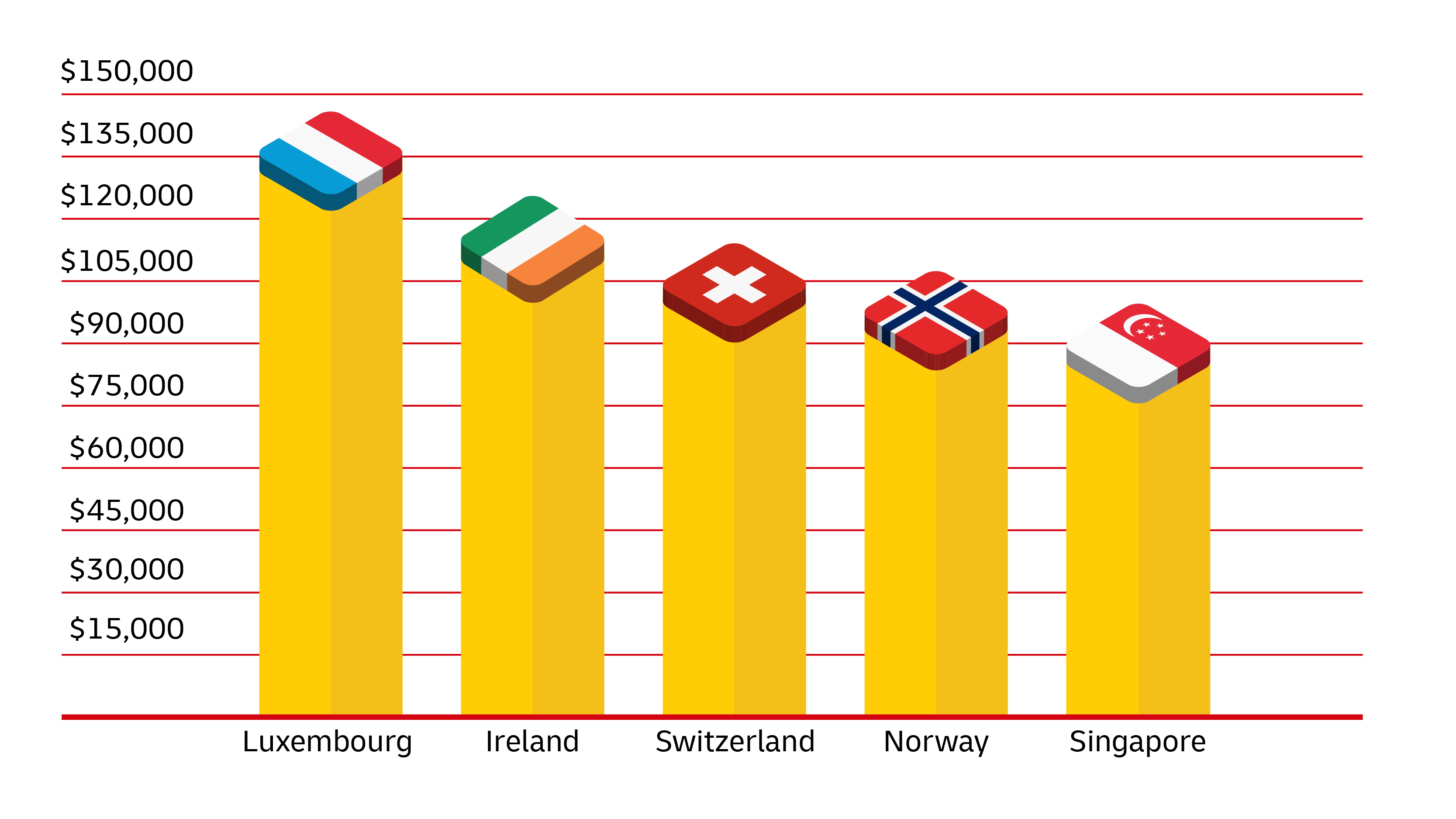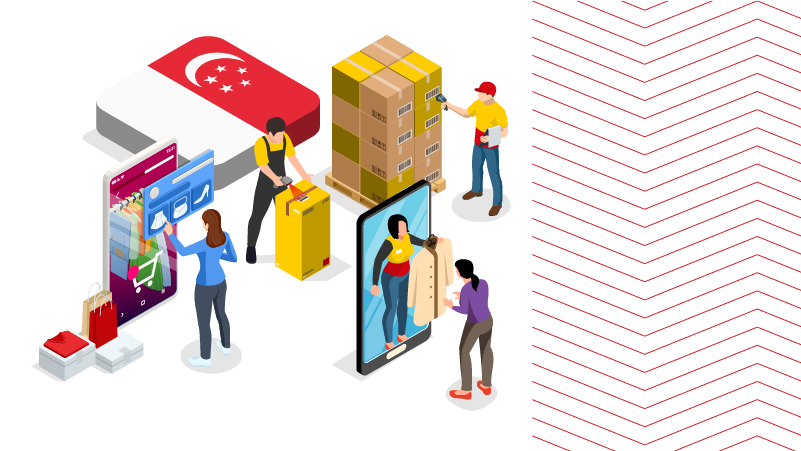Despite a population of just 5.6 million1, Singapore’s economy packs a punch. Low taxes, excellent infrastructure, strong services and banking sectors, and an almost entirely urban population have helped make it one of the world’s most advanced economies. The country has one of the highest GDP-per-capita in the world, making it person-for-person one of the richest countries on earth.2 Singapore sounds like a prime market for exporters like you, but do the numbers agree? Let’s take a look.

1% GDP growth in 2023
Singapore’s gross domestic product is growing at a modest 1%, but as an advanced, mature economy, this is a positive sign—especially given the tough global outlook.(3)

5th by GDP per capita(4)
Gross domestic product per capita – a measure of a country’s wealth (does not indicate average earnings). In US dollars.

92% internet penetration
As an economically advanced country, it’s no surprise that Singapore has a very high internet penetration.(5)

78% have made a cross-border purchase online(6)
Singaporeans are well accustomed to making online purchases from overseas sellers.

10.06% e-commerce growth(7)
Singapore’s e-commerce revenue is expected to show an annual growth rate (CAGR 2023-2028) of 10.06%.

68.4% e-commerce usage and growing
Singapore has not reached e-commerce saturation. User penetration will be 68.4% in 2023 and is expected to hit 87.5% by 2028.(8)

USD $1,250 revenue per user(9)
That’s Singapore’s expected average revenue per user (ARPU). It makes Singaporeans some of the highest-spending e-commerce consumers in the world – although ARPU in the US market is even higher at $3,840.(10)
National language: English
The four official languages are English, Malay, Mandarin, and Tamil, but English is the most widely used.
Singapore’s most popular online marketplaces11
Sorted by monthly number of online visitors.
Most popular online product categories
Most popular e-commerce product categories in Singapore12
Preferred payment methods for online purchases
Credit or debit cards are by far the most popular online payment method in Singapore, according to a survey from July 2022.8 You can read our tips for offering the most common payment methods in Singapore here.
Singapore’s biggest shopping events and destination
- Great Singapore Sale - Also known as 6.6 and 7.7, this is the biggest sales event in the Singaporean retail calendar.
- Black Friday & Cyber Monday - End of November and the start of December sales event. Consumers expect big discounts.
- Cinderella shoppers - Shopee’s new event for those who prefer to shop between midnight and 2am, with discounts available between these hours.
- 11.11 Sale Singapore (Singles’ Day) - Annual event held on November 11th, offering discounts on a wide range of products.
- Orchard Road - This is the main shopping district of Singapore. Singapore is a small country, making brick-and-mortar retail more accessible than in other larger nations.
Customs and import regulations for exporting to Singapore
- Singapore Customs applies an 8% tax on all shipments. This is known as ‘GST’ (Goods and Services Tax). Some goods also incur duty — see the below section for more on this. GST is set to rise to 9% in 2024.
- Before your business can start to import and export goods to Singapore, you need to obtain a UEN number by registering with Singapore Customs.
- All goods imported into Singapore are regulated under the Customs Act, the Goods and Services Tax (GST) Act and the Regulation of Imports and Exports Act.
- Regardless of the bulk of your shipment, all your parcels must have the necessary paperwork. You can find out exactly what paperwork is required for shipping to Singapore in this useful guide. This includes the standard paperwork: DHL air waybill (AWB) and a shipping invoice.
- Once the paperwork is processed by Singapore Customs, it is then submitted to DHL Express’s network where our certified international specialists process the shipment, without it being physically present in Singapore.
- Most shipments are successfully cleared once they are boarded enroute to Singapore. DHL Express’ import customs clearance processes are simple and are mandated by the local government.
- The submission of an import declaration and payment of duty/GST to Singapore Customs is performed electronically. Business entities are encouraged to register for an Inter-Bank payment account with Singapore Customs to make this payment easier. For non-business entities, DHL can undertake the payments of duty/tax on their behalf (subject to terms and conditions) and recover the amount upon shipment delivery.
Some goods are dutiable, and so incur both GST and duty
- Intoxicating liquors
- Tobacco products
- Motor vehicles
- Petroleum products
Each category incurs different duty rates. See this guide for more information on exact charges.
Banned items
Some goods, such as some types of chewing gum, some cigarette lighters, firecrackers and others are completely prohibited and cannot be imported into Singapore.
You can see the full list of prohibited items here.
Exporting food
You can read DHL’s full guide to exporting food to Singapore here.
Exporting to Singapore: Official websites and useful links
Singapore Customs website - https://www.customs.gov.sg/
Singapore Customs’ Quick Guide for Importers - A useful overview and a great place to start - https://www.customs.gov.sg/businesses/importing-goods/overview/
Detailed import procedures - A useful overview and a great place to start - https://www.customs.gov.sg/businesses/importing-goods/import-procedures/
DHL’s expert tips for exporting to Singapore
- Offer a seamless, hassle-free service. Be sure to use a customs broker that can take care of all the customs import and duty/tax formalities on your behalf and ensure your customers aren’t left with customs charges to pay themselves or delays to their delivery.
- Clear, descriptive, and complete paperwork gives Customs bodies a good idea of the contents within the shipment and also acts as a document of verification for both the shipper and consignee.
- Get ahead of the trends. Singapore is a very online country, and trends and habits can shift rapidly. For example, social network TikTok only just launched its shopping feature in 2022, called TikTok Shop. Would this, or similar social selling options, appeal to your customers?
Looking to export to Singapore?
DHL Express offer a complete international service for quick and reliable shipping.
Find out more






























